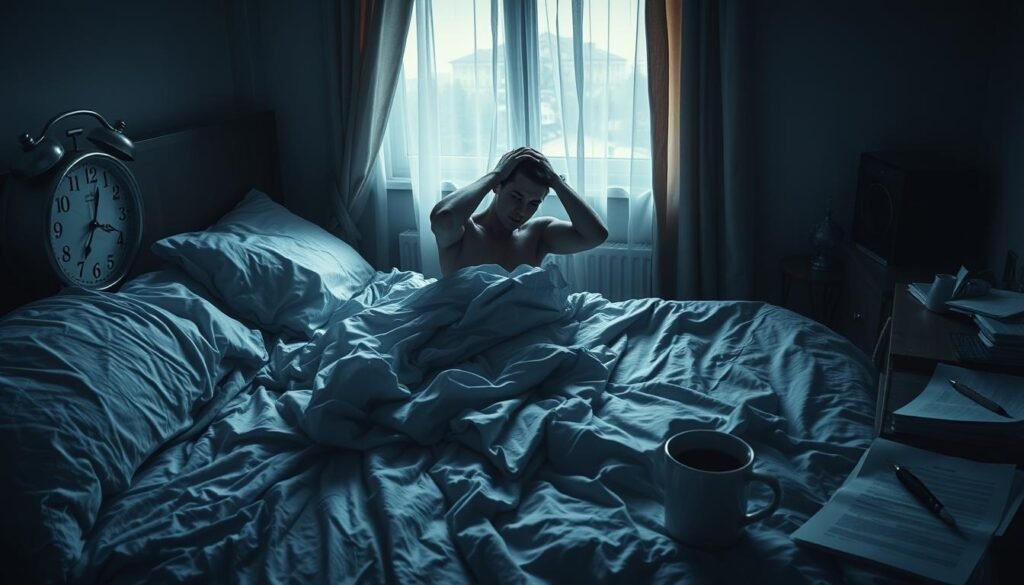Shocking statistics show that over 35% of American adults don’t get enough sleep. They miss out on the recommended 7 to 9 hours every night. This problem is often due to stress and anxiety, leading to what’s known as Stress-Induced Insomnia. It’s a complex sleep disorder where stress stops people from falling and staying asleep. The cycle starts with stress causing sleepless nights, which then makes anxiety worse, creating a vicious circle.
To tackle this issue, understanding the cycle is key. Simple sleep habits might not be enough if stress keeps you awake. Research shows that watching your thought patterns can help break this cycle. Techniques like progressive muscle relaxation and using mindfulness can improve sleep. They help lower anxiety, letting you enjoy restful nights and fight off the impact of not sleeping well.
For more tips on dealing with stress-related insomnia, look up professional advice. It can give you strategies to better your sleep routines.
Key Takeaways
- Stress-Induced Insomnia often begins with anxiety, leading to difficulties in falling and staying asleep.
- Chronic sleep deprivation can escalate health risks, including cardiovascular issues and increased anxiety.
- Practices like progressive muscle relaxation can help manage stress and promote better sleep.
- Maintaining awareness of thought patterns is vital for breaking the negative sleep cycle.
- Professional help, including cognitive behavioral therapy for insomnia, offers effective strategies for recovery.
- Integrating mindfulness into daily routines can significantly enhance overall well-being and sleep quality.
Understanding Stress-Induced Insomnia
Stress-Induced Insomnia is a common problem that affects how well we sleep. People with it have trouble falling asleep, sleep lightly, wake up often, or get up too early. About 10% of people have chronic insomnia, making it a major sleep issue. Many don’t talk to their doctors about their sleep troubles. But, it can really impact daily life and overall happiness.
What It Is and How It Develops
This type of insomnia comes from many issues, including trouble starting or keeping sleep. Stress and anxiety are big causes. They mess with how we sleep, making a tough cycle. Not sleeping enough makes stress worse. But making a bedtime routine and a calming sleep space can help a lot.
The Biopsychosocial Factors
Stress-Induced Insomnia has psychological, biological, and social roots. Anxiety traits and negative thinking can make it worse. Social situations like changes in life or money problems also play a role. It’s important to understand these factors to handle insomnia better.
The Impact of Sleep Deprivation
Stress and anxiety cause sleep problems. These problems harm our physical and mental well-being. It’s key to tackle sleep issues early, especially for those with anxiety-related insomnia.
Physical Consequences
Not sleeping enough is bad for health. It weakens our immune system, making us sick more often. It also messes with how our body uses food, leading to weight gain.
Furthermore, not sleeping enough raises stress hormone levels. This adds to health problems.
| Physical Effects | Description |
|---|---|
| Impaired Immune Function | Increased susceptibility to infections and illnesses. |
| Cognitive Impairment | Difficulty concentrating, decision-making, and coordination. |
| Weight Gain | Disruption of hormones leading to increased appetite and obesity. |
| Cardiovascular Risks | Higher likelihood of heart disease and hypertension. |
| Hormonal Imbalances | Affects testosterone and growth hormone production. |
Emotional and Psychological Effects
Sleep loss harms our emotions and mind. It makes people feel more anxious and depressed. Not sleeping enough keeps us stuck in negative thinking and harms our coping skills.
It’s worse for those with anxiety disorders, as it creates a vicious circle of sleep issues. Techniques like cognitive behavioral therapy offer help through insomnia treatment options.

Having a regular sleep schedule enhances sleep quality. Aiming for 7 to 9 hours each night helps control urges and reduces mental health risks. This shows why sleep is so important and why we should seek help if needed.
Recognizing the Signs of Stress-Induced Insomnia
Knowing the symptoms of stress-induced insomnia is the first step. This knowledge helps people tackle the condition early. Identifying symptoms early leads to better management and stops further problems.
Common Symptoms to Look For
Those suffering from stress-induced insomnia often struggle to sleep well at night. Key signs include:
- Difficulty falling asleep
- Waking frequently during the night
- Feeling unrefreshed upon waking
- Worries about not being able to sleep
- Signs like fast heartbeat, short breaths, or restlessness
Some might also get headaches, stomach issues, or feel overwhelmed. Since about one-third of U.S. adults face these issues, recognizing these signs is crucial.
When to Seek Help
Knowing when to get help is key to overcoming stress-induced insomnia. You should seek help when:
- The insomnia messes with your daily life or tasks
- Common self-help methods don’t work
- The problem has lasted for three months or more, hinting at chronic insomnia
Getting help early is very important. It prevents the problem from getting worse. Acting early promotes good health and better sleep.

Effective Strategies for Stress Management
Handling stress is key, especially when it leads to insomnia. It’s about becoming stronger and learning how to cope. Setting goals that are realistic and practicing mindfulness daily can improve your situation.
Building Resilience and Coping Mechanisms
Studies show that 44 percent of adults have trouble sleeping because of stress. This stress can create a cycle of worry and sleeplessness. Strategies like cognitive behavioral therapy change bad thought habits. They help people become more resilient against stress.
Daily Mindfulness Practices
Mindfulness every day is a strong way to handle stress. Taking just five minutes for breathing exercises can bring peace. Spending 20 to 25 minutes on progressive muscle relaxation each day helps lower stress in a few weeks.
Activities like yoga or tai chi are proven to improve sleep by calming the body. They help reduce stress hormones, making it easier to rest well.

Importance of Sleep Hygiene
Good sleep hygiene is key for restful sleep and less insomnia. Having solid sleep habits helps improve sleep quality. Many people in America struggle with sleep. A survey shows adults sleep about 6.7 hours a night, less than recommended. So, good sleep practices are vital every day.
Fundamental Sleep Habits
Starting basic sleep habits is important for fighting insomnia. Some tips are:
- Maintaining a consistent sleep schedule
- Avoiding caffeine and heavy meals before bedtime
- Limiting technology use in the hours leading up to sleep
- Engaging in regular physical activity during the day
- Only getting into bed when genuinely feeling sleepy
These steps can really help with sleep hygiene. They make it easier to fall and stay asleep.
Creating a Relaxing Sleep Environment
A calm sleep environment makes relaxation techniques work better. Here’s how to make your sleeping space ideal:
- Keep the bedroom dark, quiet, and cool
- Incorporate calming scents like lavender to promote relaxation
- Use comfortable bedding and a suitable mattress
- Minimize noise and distractions, including electronic devices
- Establish a calming pre-sleep routine, such as reading or taking a warm bath
These changes can create a sleep-friendly atmosphere. For more on sleep hygiene and treating insomnia, visit this resource. With lots of stress and sleep problems today, good sleep hygiene improves our health and mind.
Role of Cognitive Behavioral Therapy
Cognitive Behavioral Therapy (CBT) is a top choice for treating insomnia and its causes. This method changes harmful thought patterns that hurt sleep. CBT does not use drugs but improves sleep quality over time.
Understanding CBT for Insomnia
CBT for insomnia, or CBT-I, uses special techniques to make sleep better. CBT-I works by:
- Sleep consolidation – This helps you fall asleep more easily.
- Stimulus control – It means using your bed only for sleep and intimacy.
- Cognitive restructuring – This changes negative sleep thoughts to positive ones.
- Sleep hygiene – It helps create a bedtime routine.
- Relaxation techniques – Techniques like deep breathing relax the mind and body.
Studies show CBT-I decreases the time it takes to fall asleep by about 19 minutes. It also increases total sleep time. CBT-I works as well as medication, without the bad side effects.
How It Addresses Anxiety Disorders
CBT is also great for anxiety disorders. Often, anxiety leads to sleep problems. CBT helps patients change anxious thoughts, which can improve sleep. It works for long-term sleep issues and those linked to mental health.
If you need help, talk to experts. They will guide you on how to sleep better and feel mentally healthy. Here’s a link for more on treating insomnia effectively.
Exploring Relaxation Techniques
Making relaxation a part of daily life can boost well-being and sleep quality. It helps control stress, leading to better rest. Mindfulness meditation and progressive muscle relaxation are very useful.
Mindfulness Meditation and Its Benefits
Mindfulness makes you aware of your thoughts and feelings without judging them. It eases anxiety before bed for a peaceful mind. It slows your heart and lowers blood pressure, helping you fall asleep.
People practicing mindfulness often enjoy better focus and mood. They also sleep better. Around 23% of adults with insomnia try relaxation techniques like mindfulness for help.
Progressive Muscle Relaxation Techniques
Progressive muscle relaxation means tensing and then relaxing different muscles. It helps reduce muscle pain and tension. This method is ideal before bed.
Many find it helpful to mix this method with others, like deep breathing. Doing these regularly prepares you for a good night’s sleep.
Mind-Body Connection and Its Influence on Sleep
The mind and body are closely linked, affecting how well we sleep. Stress is a big sleep disrupter. It changes sleep cycles. Chronic stress harms deep and REM sleep, which we need for health and rest.
This can make sleeping well hard, leading to more stress. It’s a tough cycle to break.
The Science Behind Stress and Sleep
Stress and sleep affect each other a lot. Stress raises cortisol, which keeps us awake when we should be sleeping. Stress can be sudden, like losing money, or ongoing, like work trouble. It often leads to insomnia.
Many Americans, between 9-20%, struggle with insomnia. Stress and anxiety are big causes.
Integrating Physical and Mental Well-Being
To sleep better, mix physical and mental health activities. Exercise helps reduce stress. It makes our lives more balanced. Mindfulness and managing stress build emotional strength, leading to better sleep.
Understanding the mind-body link is crucial for solving sleep issues tied to stress. If we feel better mentally, we sleep better too.